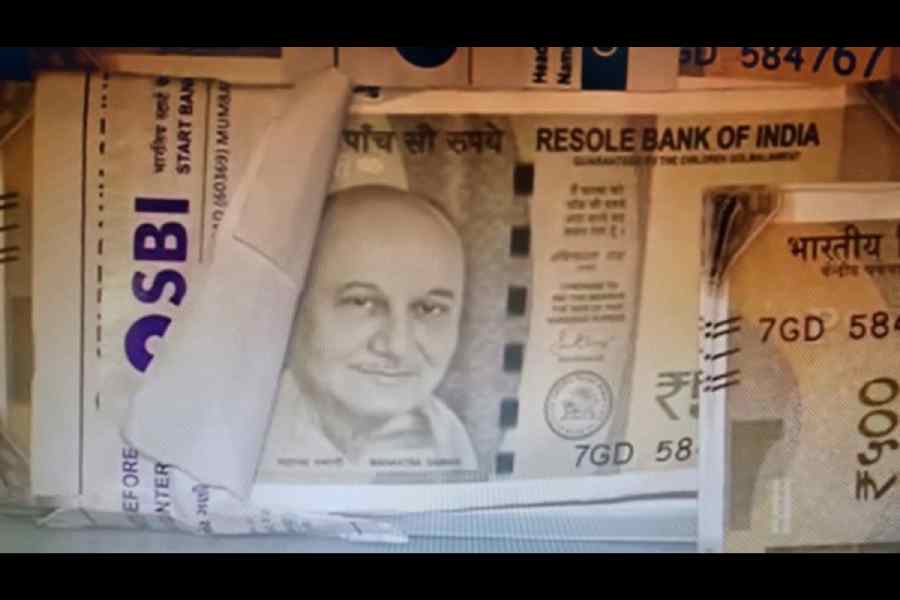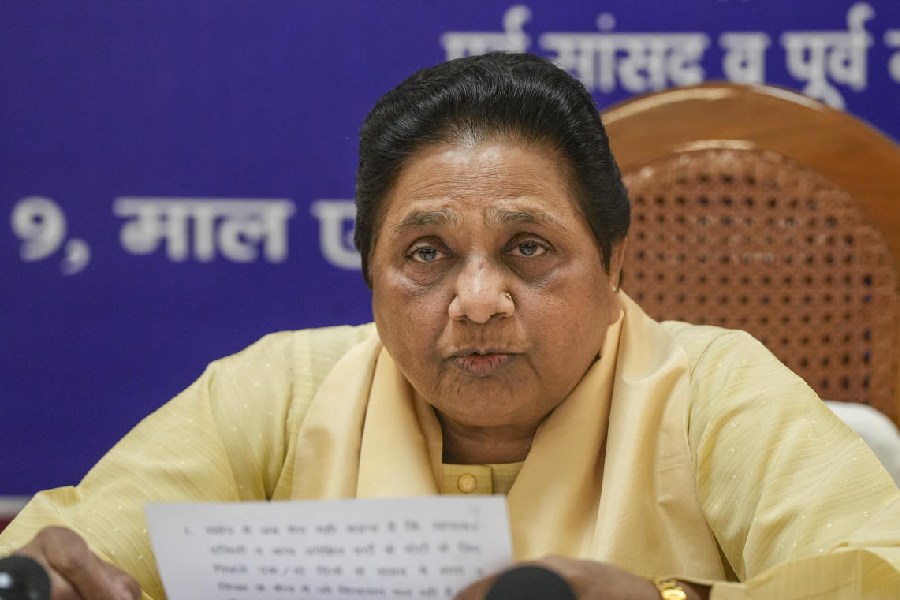Identity crisis
Sir — The magic of films demands the willing suspension of disbelief. This is why someone like Anupam Kher — he shares M.K. Gandhi’s signature bald head — would be easy to pass off as the Mahatma with a few tweaks of costume, such as the addition of a walking stick and a dhoti perhaps. But to mistake Kher for Gandhi in real life is like mistaking apples for oranges. Yet, in a strange incident, a trader from Gujarat was scammed out of Rs 1.6 crore using counterfeit Rs 500 currency notes that featured Kher’s image instead of Gandhi’s. To make matters worse, the fake notes also had “Resole Bank of India” written on them in place of “Reserve Bank of India”. The trader’s vision seems to have been glazed over by greed for him to mistake Kher for Gandhi.
Dipjit Basak, Calcutta
War spreads
Sir — Israel recently conducted an airstrike on Beirut that killed the Hezbollah leader, Sayyed Hassan Nasrallah (“Israel’s ‘targeted strike’ kills Hezbollah chief”, Sept 29). In the past few months, Hezbollah, the Lebanese militant group backed by Iran, has endured continuous attacks from Israel, from the killing of the outfit’s top military commander in July to the recent explosion of communication devices used by its leaders. Israel’s sophisticated intelligence seems to have penetrated deep into Hezbollah. The Israeli prime minister, Benjamin Netanyahu, has defied repeated calls for peace. Such brinkmanship is preventing any effort to achieve a ceasefire.
Jayanta Datta, Hooghly
Sir — The assassination of the Hezbollah chief by Israel marked a new turn in the conflict that has been raging on for a year. With both Hezbollah and Hamas involved, the multi-front war will engulf the entire Middle East with the allies of the warring sides also getting sucked into it. It would not be an exaggeration to say that it could lead to a World War-like situation threatening the global economy and peace.
K. Nehru Patnaik, Visakhapatnam
Sir — The killing of Sayyed Hassan Nasrallah comes as a big blow to Hezbollah. Israel now finds itself fighting a two-pronged war against both Hamas and Hezbollah. Hezbollah cannot step back from the conflict after the assassination of its chief and other top officials. The threat of an all-out war in the Middle East is palpable. The influence of the global peacekeepers on Israel seems to be diminishing.
D.V.G. Sankara Rao, Andhra Pradesh
Sir — Israel’s elimination of the Hezbollah chief in Beirut will have far-reaching consequences for regional stability and global peace. The fire that Hamas lit with its surprise attack on Israel last October has now exploded into a full-blown war. Much of Gaza is already in ruins as a result of relentless Israeli bombings and ground assaults. Both sides are now being compelled to strongly retaliate. The present escalation, if not stopped, can have Gaza-like implications for Lebanon and Syria.
Kamal Laddha, Bengaluru
Right rises
Sir — Swapan Dasgupta’s column, “Remote control” (Sept 26), was interesting. Europe is increasingly taking a turn towards conservatism with the electoral success of ultra-Right parties. This is especially true of central Europe where the far-Right, anti-migration Freedom Party led by Herbert Kickl recently won the elections in Austria. Perhaps the spike in immigration to Europe since the last decade has bolstered this preference for protectionism. Further, this anti-immigration stance is not just true of Europe but the entire West. Countries are becoming inward-looking, signalling the end of globalisation.
Fateh Najamuddin, Lucknow
Sir — Europe seems to be under the grip of fascism for the first time since the deaths of Adolf Hitler and Benito Mussolini. Even though right-wing forces are not a majority in the European Parliament, they have strengthened their hold in key countries like France and Germany.
The victories of the ultra-nationalist Alternative for Democracy in Germany and Herbert Kickl’s Freedom Party in Austria are proof of this regressive trend.
Jang Bahadur Singh, Jamshedpur
Derailed
Sir — The editorial, “Tram spotting” (Sept 30), argued the significance of trams
in solving vehicular pollution in Calcutta. Calcuttans have a strong emotional connection with the tram, which is part of the city’s heritage. The editorial makes a valid point about the need for modernising trams while keeping in mind 21st-century transportation problems. Discontinuing the streetcar service would also be a huge loss to Calcutta’s heritage.
T. Ramadas, Visakhapatnam
Sir — Jibanananda Das, the great Bengali poet, was killed in a tram accident in 1954. Seven decades later, the tram service in Calcutta is set to take its last breath. The tram was featured in many Calcutta-based films during the Sixties that portrayed the struggles of ordinary Bengalis. Nothing much seems to have changed since that period — employment opportunities are still scarce and Calcutta has remained the same in offering little to its people.
Alok Ganguly, Nadia
Young gun
Sir — The appointment of Udhayanidhi Stalin as the deputy chief minister of Tamil Nadu marks his anointing as the political heir to his father, M.K. Stalin, the Tamil Nadu chief minister and the Dravida Munnetra Kazhagam chief. The Opposition’s criticism against dynastic succession does not hold water in the case of Udhayanidhi Stalin. But his commitment to the causes of social justice and secularism has been exemplary.
G. David Milton, Maruthancode, Tamil Nadu










